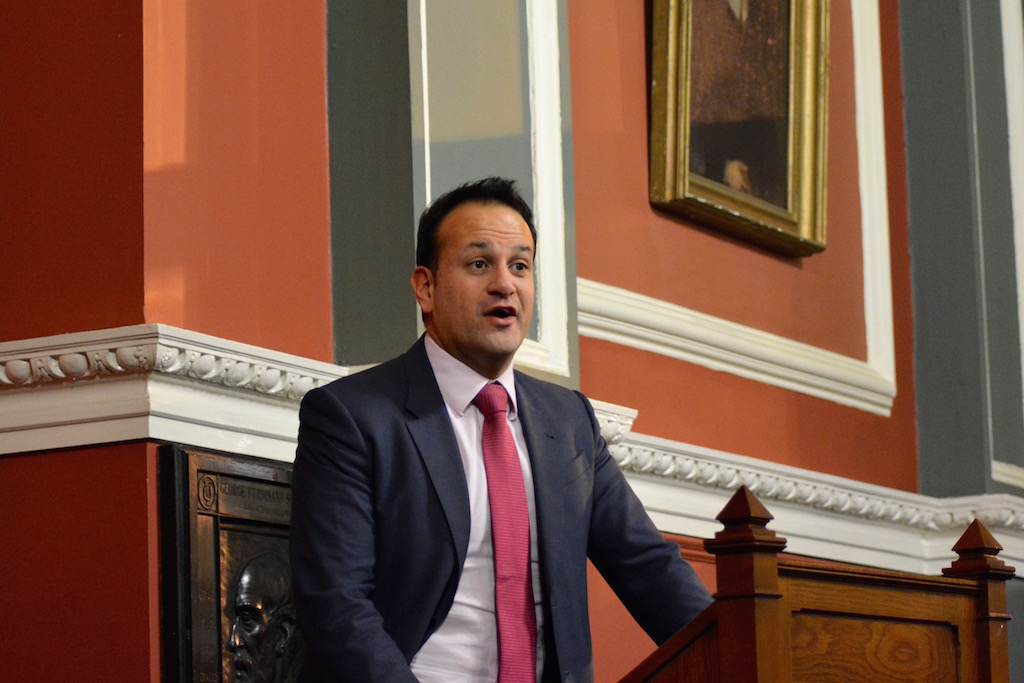Minister for Health Leo Varadkar spoke to Trinity Politics Society last night on a number of issues, including higher education funding, the importance of the marriage equality referendum and the ongoing reform of the HSE.
Despite a poor turnout at the event, those present responded warmly to Varadkar’s wry comments on political events and his political career so far. Varadkar entered Dáil Eireann in 2007, and played a significant role in the marriage equality referendum after coming out as gay.
Responding to a question from The University Times asking Varadkar to confirm Fine Gael’s commitment to implement the recommendations of the government higher education funding working group, chaired by Peter Cassells, Varadkar responded: “We would have to wait and see what course of action we will take with regards to higher education funding” and that “it would be pretty foolish to back what you haven’t seen”. The group’s report, due to be published by the end of December, is widely expected to recommend a government-supported student loans scheme.
Varadkar’s address began with his entry to political life and his first electoral victories and defeats. The Minister said: “I did not have a particularly political background but I was somebody who was always interested in politics and I don’t really know why”. Varadkar then discussed his decision to join Fine Gael. The Minister joined the party as he felt Fine Gael would say the thing “people didn’t want to hear” and that the party seemed to him to make the right choice even if it was the unpopular one.
Varadkar’s first election attempt was successful when his classmates elected him to his student council in secondary school. In Trinity, the minister was an active member of Fine Gael and was involved in his first local election in 1999, at 20 years old. Varadkar admitted that he “didn’t really have a clue what he was doing” in the local election, perhaps the reason he only received 380 votes in his constituency. However, Varadkar believes a person should “fail forward” and learn from their mistakes. His next attempt in 2004 resulted in the largest personal vote in the local elections in Ireland.
An audience member asked if any period of his career had him “bricking it”, causing Varadkar to cite his ministerial appointments in 2011 and 2014 as examples. The rest, Varadkar dryly commented, would be saved for his autobiography. As Varadkar did not support Enda Kenny in the leadership heave in 2010, he was the last to find out his cabinet positions. Varadkar painted a humorous picture of himself waiting to find out his appointment in 2014 in the press office, recalling how he missed the Taoiseach’s call as he was attempting to find out other cabinet appointments.
Varadkar then discussed Fine Gael’s achievements while in government, praising in particular economic stabilisation and balancing public finances. In terms of public service reform, Varadkar described the party’s success in reducing state bodies but admitted that some public services had been cut too much and needed rebuilding, referring in particular to the Gardaí and Army which had not recruited in several years.
Reform of the healthcare system in Ireland takes up most of Varadkar’s time and the Minister admitted the government might have promised too much regarding the public health service when seeking election. Fine Gael has not delivered on universal health insurance but Varadkar believed the first steps to access the health service for all were taken. Varadkar approved of extending free GP healthcare to children under 6 and for senior citizens over 70. Varadkar admitted to the difficulties the HSE is facing, citing the lack of specialists as the main weakness of the service and as the cause of long waiting lists.
Varadkar described the marriage referendum as a “phenomenon” and less of a referendum and more of a “social movement”. The massive involvement of young people in the referendum campaign is something that astounded the minister and unfortunately, Varadkar does not believe this level of political engagement will be repeated. The referendum was a “once in a generational opportunity” according to Varadkar “to set a really good example to the rest of the world for issues of liberty and equality”. The practical unity of the country over the issue brought great pleasure to the minister and it is evident in the manner he speaks of the result.
Varadkar claims he does not know where politics will take him, but based on last night it is clear he has not reached his destination just yet. Varadkar believes the best thing about politics is its unpredictability. A politician addressing a group of students could have dreary implications, but the students leaving the GMB chamber after Varadkar’s talk would beg to differ.







